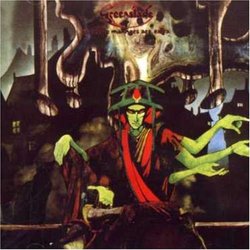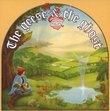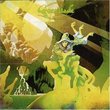| All Artists: Greenslade Title: Bedside Manners Are Extra Members Wishing: 5 Total Copies: 0 Label: Wounded Bird Records Original Release Date: 1/1/1973 Re-Release Date: 12/5/2006 Genres: Pop, Rock Styles: Progressive, Progressive Rock Number of Discs: 1 SwapaCD Credits: 1 UPC: 664140686625 |
Search - Greenslade :: Bedside Manners Are Extra
 | Greenslade Bedside Manners Are Extra Genres: Pop, Rock
Japanese remastered reissue of the progressive rock act's 1973 album, packaged in a limited edition miniature LP sleeve. |
Larger Image |
CD DetailsSynopsis
Album Description Japanese remastered reissue of the progressive rock act's 1973 album, packaged in a limited edition miniature LP sleeve. Similar CDs
|
CD ReviewsGreat and underrated prog rock BENJAMIN MILER | Veneta, Oregon | 05/06/2005 (4 out of 5 stars) "I have been long aware of Dave Greenslade, like his works with Colosseum, his stuff with his group Greenslade, and his solo efforts. Bedside Manners are Extra is my first try at a Greenslade album, but not my first exposure to Mr. Greenslade himself (for example, I have Colosseum's Valentyne Suite, which I highly recommend to those who like bluesy progressive jazz rock). This is Greenslade's second album, released later the same year as their self-entitled debut (1973). Cover artwork is by Roger Dean, just like their first album. The Greenslade logo was also created by Dean, which is pretty obvious. Each of the four musicians had already been in established bands. Keyboardist/vocalist Dave Lawson had been previously in a final version of Web (after the group's original vocalist John L. Watson left in 1970) for their album I Spider (1970). The group then changed their name to Samurai and released one, self-entitled album in 1971 (not to be confused with a Japanese band called Samurai who existed at the same time and released a couple albums themselves with Green Tea and Kappa). Keyboardist Dave Greenslade, well we all know his involvement with Colosseum, who three studio albums (as well as American variants on the ABC/Dunhill label to confuse matters worse) and one live album. Bassist Tony Reeves was also involved in Colosseum (only on their first two albums), and prior to that, John Mayall's Bluesbreakers (in which another Colosseum member participated, that is Dick Heckstall-Smith). And then we have Andrew McCulloch, who was briefly a member of King Crimson for their album Lizard, and then with Fields (which featured ex-Rare Bird keyboardist Graham Field). There is one thing Greenslade had in common with the 1969-70 version of Rare Bird and that was the group featured two keyboardists and no guitarists (let's not forget that Dave Greenslade's first solo effort, Cactus Choir from 1976 featured ex-Rare Bird vocalist Steve Gould). But musically, they don't sound much like Rare Bird. The music has a more bombastic-style of keyboard-lead prog, although more restrained than Emerson or Wakeman. I notice the ocassional Genesis and ELP-influence in the music. For the most part the music is more traditional prog rock, and I recommend to those who might have not been too keen on the bluesy jazzy nature of Colosseum. There isn't much of that Colosseum sound to be found here. Bedside Manners Are Extra features plenty of Mellotron (a good reason to buy this album), as well as Hammond organ, piano, electric piano, and ARP synth. The title track starts off deceptively as soft rock. Most of this piece tends to be mellow, but it gets more progressive as the synthesizers and Mellotron kicks in. Perhaps the biggest problem one has of the Greenslade album is Dave Lawson's singing. Here he has that high-pitched voice that's definately an acquired taste (he didn't have such a high-pitched voice on Web's I Spider). Only three of the album's six cuts have vocals, the rest are instrumental. The next piece, "Pilgrim's Progress" features a recurring theme played on Mellotron. I was a bit thrown-off by the lighthearted nature of this piece. "Time to Dream" has a more Genesis-like feel in places, especially the Mellotron passages. "Drum Folk" is one of the more criticized pieces on this album because the drum solo occurs twice, but the wonderful themes and great use of Mellotron more than makes up for it. "Sunkissed You're Not" is another pleasant number, with some nice jazzy passages to go with it. The last piece, "Chalkhill" starts off with a theme being repeated a few times before going in to a lenghty keyboard solo that closes the album. To me, this is actually an excellent prog rock album to have. Maybe just a little short of being essential, but still worth having for those who enjoy keyboard-dominated prog rock." A happy, but uneven album. Robert Cossaboon | The happy land of Walworth, NY | 09/14/2003 (3 out of 5 stars) "Mid-seventies Greenslade might very well be the mariachi of progressive rock. Just about all of his songs are bouncy with catchy, interesting keyboard solos. The lyrics tend towards tight one-lined cleverness, but are never overly sentimental or bitter. The title track and "Pilgrim's Progress" are fine vehicles for some awesome keyboard solos. "Time To Dream" is made exceptional for Dave Lawson's vocal and another keyboard solo. "Drum Folk" unfortunately is too long cumbersome for the needless drum solo, which spoils and detracts from the extended organ workout afterwards. "Sunkissed you're not" begins with a weak vocal, but builds to a redeeming funky jazziness. The last track, "Chalkhill" is the third instrumental and, despite the fact that it is the most propulsive of the three, seems to lack the imagination of the former two. In all, the Bedside Manners Album may not be the most progressive of rock albums, but it is a wonderful time piece of mid-seventies music." Good, but needs a little tweaking Jeffrey J.Park | Massachusetts, USA | 08/01/2005 (3 out of 5 stars) "This is the 2nd album by keyboardist Dave Greenslade, who is joined by fellow Colosseum alumnus bassist Tony Reeves, superb drummer Andy McCullough (he played on King Crimson's Lizard LP, 1970), and keyboardist/vocalist Dave Lawson. While all of the musicians are decent enough, it is Andy McCullough that really makes this recording take off. His great drumming, along with the heavy use of synthesizers and moody mellotron atmospherics, makes this recording very listenable and yes, even enjoyable. All of the six pieces feature wonderful melodies, and are evenly divided between instrumental passages and vocal pieces. While the instrumental pieces are pretty good (especially Pilgrim's Progress) and feature some nimble ensemble work, Dave Lawson's vocals are an acquired taste and can be best described as unnaturally high-pitched and somewhat forced - it sounds as if he sings with his throat and not his diaphragm. While most tracks flow reasonably well, the instrumental Drum Folk is desperately in need of a better arrangement. This track alternates thunderous, highly virtuosic drum solos by Andy McCullough with riff heavy ensemble work, and very haunting, delicate parts played on mellotron and soft organ. Trust me, it as much of a messy hodgepodge as it sounds, and it's unfortunate too - the drum solo is excellent and the haunting parts are just great. I just wish it had all been integrated better. All in all, I enjoyed this disc and would recommend it to any fan of progressive rock, although I suspect the typical Yes/Genesis/ELP devotee might find it a bit lacking."
|

 Track Listings (6) - Disc #1
Track Listings (6) - Disc #1
